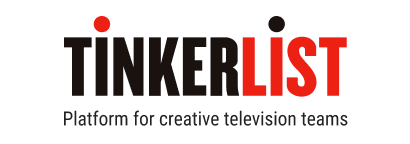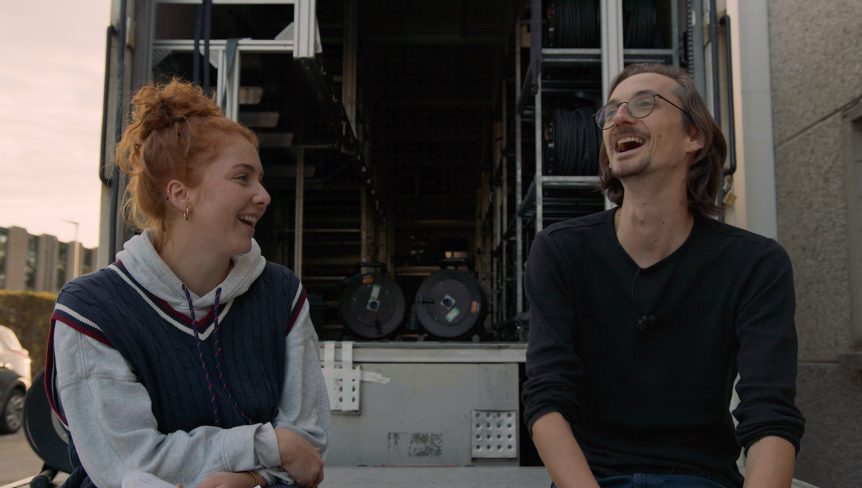At one of the last episodes of De Cooke & Verhulst Show of 2021, we had the opportunity to talk to showrunner Mathieu Dams about how it is like to write such show in (non) pandemic times and what value TinkerList has for the production team. Enjoy!
?️ Interview by Rosie
Mathieu, how are you?
Hi! I’m good, thanks. A little bit stressed because we’re starting our show in half an hour, but I’m good I’m good.
So we’re here at De Cooke & Verhulst Show, what do you do?
I write the show. So I have a team of three colleagues and together we make the show. First we search everyone, all the topics we want to discuss and when we have that I literally just write the show and write what questions are being asked, what the hosts are saying,… that stuff.
And what makes a good show for you?
A lot of different things. In our case, there’s a couple of ingredients that we want to have in each show: we want to laugh, most of all, we want to have a serious topic as well, and we want to have some interaction between all our guests around the table. And when that happens, we’re satisfied, we’re happy.
And what makes a good guest then?
The most important thing to me is how well they talk. If your guest is a fluent talker, can talk about literally everything, then any topic can be a good topic. You can talk about tires of a car, which sounds boring, but if the guy or the woman talks well about it, and has interesting things to say about it and you learn something new, then it’s a good topic. So then it’s a good a good guest.
So last year, everything was remote. There was no live audience, the setup was remote… How is that different to this year and to a normal show?
It was a lot different, obviously, because you were making the show from literally your own home. In my case, it was in my bedroom because it was the most quiet place in the house with two young children. So the main difference was that you didn’t have any direct contact with your colleagues and your coworkers. Now obviously we’re back together again, we can see each other face to face, which makes things easier to have quick adjustments.
So what challenges did you have when working remotely?
I think most of all, the quickness of everything. Like sometimes, especially in the last hour before you start taping your show, there’s always last minute adjustments and last minute changes: a clip has to be changed or a photo has to be uploaded and stuff like that. If you work remotely, you always have to call or chat or do something but here we’re literally sitting together around the same table. So it’s just one question, face to face: “Can you quickly do that?”, “Oh, yeah, I got it.” and then it’s settled. So that was the biggest challenge, I think.
Better communication.
Yeah, yeah, yeah. And it’s a lot more fun if you’re together, obviously.
Yeah. the energy.
Yeah of course.
Like we were all just chatting from our living rooms, from the bedrooms, chatting with each other and doing facetimes and everyone was a little bit more chill. Which was a good thing but I mean… You need a little stress and energy.
– Mathieu Dams
What challenges do you have when doing a normal show and how would you compare that to the remote one?
Um, that’s a good question. I don’t know. I think maybe for some reason I was less stressed working remotely because I was in the comfort of my own home. And I think that’s that was part of it. Stress is- how do you say it- is infectious?
Contagious.
Yeah, yeah. Someone is stressing and is running around and everyone around the person becomes stressed as well, that was completely different. We were all just chatting from our living rooms, from the bedrooms, chatting with each other and doing facetimes and everyone was a little bit more chill. Which was a good thing I mean… You need a little stress and energy, otherwise…
Could be dangerous!
Yeah exactly.
What would you prefer: working remotely or live?
I always would prefer to work together with other people just because it’s more fun. It’s more fun after you taped a show, and it was a good one, to happily have a beer together with everyone and to discuss the show. It’s so much more fun than having watched, you know, the show remotely, and then it’s finished and there’s no ending. I mean, it’s finished but everybody’s
in their own different areas, homes and there’s no climax.
“Now I can just stay in my bed.”
Yeah, yeah, yeah. It’s… I mean, it can come in handy sometimes, but it’s a lot more fun to just kick back and discuss a show you just taped and have a beer and bond with your colleagues, of course. Yeah.
And would you say working remotely has made you more flexible?
Oh yeah. Definitely. We’ve done a couple of things differently now than we did before. So the whole Covid pandemic thing did change a couple of things in the way we work, the way we communicate. Like we have a little bit more structure now in our meetings and in the way we we set up every day: we start and then we have a meeting with those people, then our hosts come and we have a meeting with them. It was a lot more chaotic before. But the pandemic and working remotely, it… obligated us to work very structured.
I like to have different different opinions and different energies. in the end, I think that kind of diversity makes for a better show.
– Mathieu Dams
Would you point out some difficulties and opportunities when you collaborate with your team?
Oefff, I have to think about that… (laughs) The difficulties and opportunities are always around the same thing: you’re working with other people who all have their own agenda, their own things that they want to accomplish, their own sensitivities, their own pet peeves, you know, stuff like that… So I think the most challenging thing is to coordinate all those different opinions and energies sometimes. But usually it works perfectly. I like to have different different opinions and different energies. And some people are more extroverted, open and direct, and there are people who are more introverted. So it’s sometimes a challenge to juggle all those different balls. But in the end, I think that kind of diversity makes for a better show.
So it also requires like human feeling to do your job?
Yeah, yeah, definitely.
How does TinkerList facilitate your job?
I think it makes it a lot easier because if you make a change, everyone can see it instantly. I don’t work. I don’t work in television that long, just a couple of years. So I didn’t know the “before TinkerList phase”. But I hear it from colleagues that they have to print scripts 20 times a day every time something new changes or something like that. Now it’s like instant change. I maybe send a little message to our assistant director, like “I just change this.” And she: “Oh, yeah, I can see it. It’s perfect, it’s fine. Thanks.” So, yeah, it’s really easy. I wouldn’t know how it was before, but I think it was a lot more difficult.
So that’s the added value of TinkerList?
I would say so, yeah, yeah.
What were your major learnings so far to do better in the future?
(laughs) WOW!
We’re almost at the end of the year you know… (laughs)
It’s a process, and you learn every day. You learn how to work with people,
how to communicate with people better. I mean, I learn on the job every day. Also just how to write better, how to adjust questions or how to formulate questions for which kind of person that has to be saying them. Like we have two hosts in our show. For one host, I write differently
than for the other. And that’s something that you can only learn on a job and learn by how they are reacting to the lines that you write. How they literally articulate those lines. Sometimes it can be a little more difficult so that’s something I’m learning every day.
But I think the most encompassing thing of everything is that you’re working with people. Every day it creates a new challenge. Every day you learn something new. Every day there’s something that you wish
you’d done differently.
Do you have anything else to add to our conversation?
Not really. I love my job and I hope to keep doing it. That’s the most important thing. (laughs)
Thank you Mathieu for the chat.
No problem. Thank you.
Good luck with the show in a couple of minutes!
Yeah, I have to get going! (laughs)
Special thanks to De Cooke & Verhulst Show for having us and to Mathieu Dams for making time to answer our questions.

